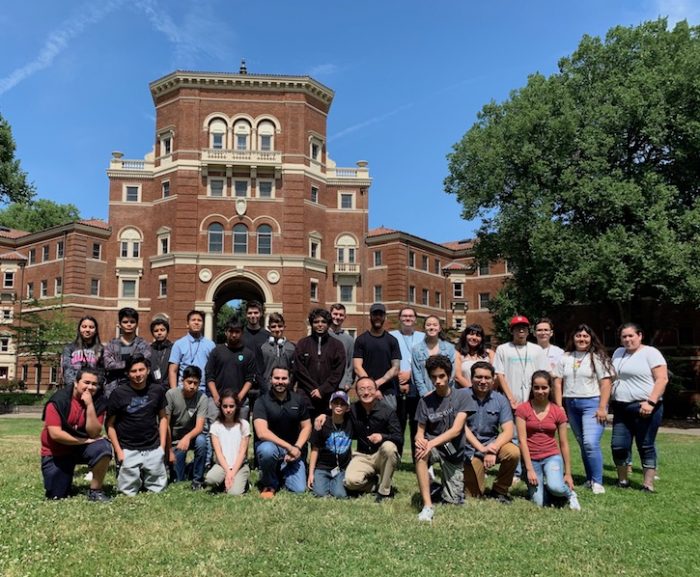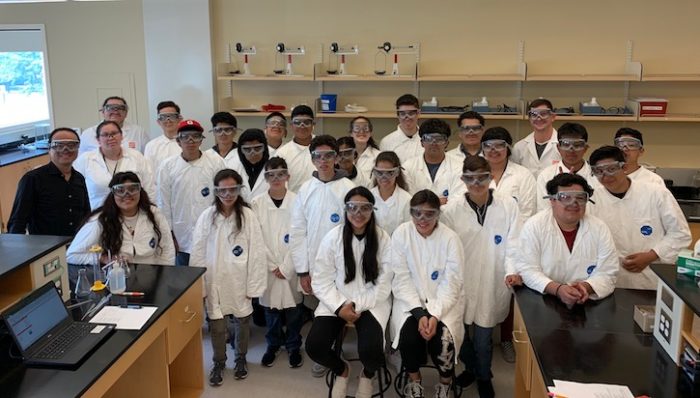Measuring the radioactivity of bananas. Enjoying a batch of homemade liquid-nitrogen frozen vanilla ice cream. Standing back as a giant foamy snake spirals up out of a beaker in the explosive experiment known as “Elephant’s Toothpaste.” All were a part of the third annual Juntos Chemistry Overnight Camp, held June 29-30, 2019, for 22 Oregon high school students.
The camp is designed to introduce Latino high school students to STEM-related fields while providing a taste of college life at Oregon State. This year, the camp built on its past successes and added several new, innovative activities. The participants included seven girls and 15 boys from Corvallis, Newport, McMinnville, Portland, Redmond, Madras and Coos Bay.
The 2019 camp was organized by Chong Fang, an associate professor of chemistry, Juntos Statewide Coordinator José García, graduate students Taylor Krueger and Sean Boulanger and undergraduate students Travis Seevers and Jose Ceja. All of the students are members of the Fang Research Group. This year’s Juntos Camp was jointly funded by OSU’s Chemistry Department, the College of Science and Fang’s NSF CAREER grant.
 For the first time, campers stayed in Weatherford Hall, a landmark building on OSU’s campus renowned for its aesthetic design and spacious, light-filled quarters. After settling into their rooms Saturday morning, campers enjoyed an energetic welcome from chemistry professor May Nyman, who shared her research on radioactivity, debunking common myths about nuclear chemistry and answering a variety of pressing student questions. Campers examined actual (and harmless) radioactive samples from Nyman’s Lab and measured the radioactivity of everyday objects, including fire-alarms and the aforementioned bananas.
For the first time, campers stayed in Weatherford Hall, a landmark building on OSU’s campus renowned for its aesthetic design and spacious, light-filled quarters. After settling into their rooms Saturday morning, campers enjoyed an energetic welcome from chemistry professor May Nyman, who shared her research on radioactivity, debunking common myths about nuclear chemistry and answering a variety of pressing student questions. Campers examined actual (and harmless) radioactive samples from Nyman’s Lab and measured the radioactivity of everyday objects, including fire-alarms and the aforementioned bananas.
After a campus tour, students delved into two colorful labs. The first was designed to mirror what first-year OSU students experience in a general chemistry class. Campers learned how to use a spectrophotometer to analyze the type and amount of food dye present in different flavors of Gatorade, and successfully blended red and blue dyes to recreate the exact purple shade of Rain Berry Gatorade.
“I learned a lot of new things,” said one camper, “and I want to learn more.”
The second lab was a tour of the very spot in Gilbert Hall where Mas Subramanian, Milton Harris Chair Professor of Materials Science, discovered the first new pigment of blue in over two centuries, a find which attracted worldwide attention and inspired a new Crayola crayon, Bluetiful.
In the late afternoon, students enjoyed free time. Many campers and chaperones joined an impromptu game of soccer along with several current OSU students, while others played air-hockey, foosball, pool, and board-games in the basement of Weatherford.
One of the highlights of the camp every year is a science-themed game of Jeopardy replete with rousing demonstrations. This year’s game included old favorites, such as Elephant’s Toothpaste (an explosive, foamy reaction caused by the catalytic decomposition of hydrogen peroxide) and the new Burning Rainbow, a colorful display of flames caused by the burning of different salts commonly used in fireworks. The night culminated in the making and eating of liquid nitrogen vanilla ice cream in the atrium of Linus Pauling Science Center (LPSC), the Jeopardy winners enjoying the first taste.
After their first overnight ever in a college dorm, campers awoke to a Sunday that featured a short presentation by Fang on physical chemistry and the state-of-the-art molecular movie technology developed at Oregon State. Next, in Fang’s ultrafast spectroscopy lab on the second floor of LPSC, students were dazzled by the forest of optics on the air-float laser table, asking many questions as they saw how shooting lasers for only a millionth of a billionth of a second can reveal the molecular mechanisms that power everything from human vision to jellyfish luminescence, calcium biosensors and solar cells.

In a second chemistry lab, students analyzed the hardness of drinking water, followed by lunch. The lively discussions that erupted over lunch between students and camp staff were evidence of how a vibrant, intellectually curious community had taken root in just over a day. The students had an after-lunch treat of a presentation entitled “Chemistry of Life” by graduate student Sean Boulanger.
Campers described the camp as “fun,” “exciting,” “cool” and “amazing.” Several mentioned a clear interest in attending Oregon State and/or majoring in science as a result of the camp. “I learned a lot of new things,” said one camper, “and I want to learn more.” Juntos Coordinator José García would like to recruit more campers for 2020. “It’s a great way to experience a sneak peek into life as a college student on campus, and as a STEM student.”
“I am very happy that the third Juntos Chemistry Overnight Camp turned out to be such an action-packed and memorable event,” reflected organizer Chong Fang. “Several campers returned from last year. The seed of STEM we have planted in these curious minds across Oregon, through their peers, families and friends, is sure to power tomorrow’s science and engineering workforce in Oregon and beyond.”



